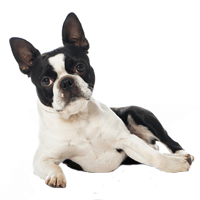
Note: This breed does not tolerate the heat well and is sensitive to anesthesia. It is prone to corneal abrasions. Caesarian deliveries are commonly needed.
Average Size of Male: Height: 15 – 17 inches, Weight: 10 – 25 pounds
Occasionally seen: Deafness, hydrocephalus, esophageal achalasia, distichiasis, persistent right aortic arch Major concerns: none
Minor concerns: Cataract, PDA, patellar luxation, stenotic nares
Average Size of Female: Height: 15 – 17 inches, Weight: 10 – 25 pounds
Life span: 10 – 14 years
Suggested tests: None
Brief History on Boston Terrier Origin
One story claims that at around 1865, coachmen who were working for wealthy families in Boston were the ones who actually started to breed some of their employers’ dogs. It is said that one of these pairings, between an English terrier and a Bulldog, produced a dog that came to be known as “Hooper’s Judge.” In this exposition, Hooper’s Judge weighed over 30 pounds. Allegedly he was bred with a smaller female, and the male offspring was later bred to another smaller female. Creating an overall smaller version of the dog. Some believe that later generations were likely bred with French Bulldogs. It was in 1889 that the breed gained a popular reputation in Boston, and enthusiasts formed the American Bull Terrier Club. However, that name for the breed did not last. Shortly after, the breed was named after its original birthplace, and the name “Boston Terrier” was adopted permanently. It is said that this breed was originally used for fighting, but today the breed does not generally show any type of aggressive behavior or is used for anything of the sort. The Boston terrier was recognized by the AKC in 1893.
Boston Terrier Breed Appearance
A nicely built dog, the Boston Terrier is compact, short and sturdy. The shoulders of this dog are sloping, the front legs are straight, and the back legs feature strong thighs. Their little round feet have well-arched toes and short nails. The expression of the Boston terrier is best described as alert and happy. The round eyes are set wide apart and are normally always dark in color. Small and erect, the ears can be cropped or left natural. Their short, square muzzle has a wide, black nose. The square jaw offers short, regular teeth that meet in an even or underbite. The slightly-arched neck carries their head gracefully, and their tapering tail is straight or screwed, and set low. The gait of the Boston terrier can be described as sure-footed, graceful, and energetic. The short, smooth coat of this breed is fine in texture, and the coat can be found in brindle, seal, or black with white markings.
Boston Terrier Breed Temperament
The Boston Terrier is considered to be extremely good with children and particularly good with the elderly and senior citizens. This dog is generally friendly toward strangers, and will usually always get along well with other non-canine pets. It has been known to be a bit aggressive with strange dogs, and some males may be domineering in nature. This breed likes to be part of a family. It loves human contact and socialization, and that makes for a great companion dog. The Boston terrier can be very lovable, yet it can also be very independent at times. It can be headstrong also, but it is definitely a clever and quick learner which can make up for it’s stubbornness. This breed is very sensitive to the tone of voice being used with it. It is eager to learn and is not difficult to train compared to some other breeds.
Boston Terrier Breed Maintenance
The smooth and very short coat of this breed does not require much maintenance. Occasional combing or brushing with a firm bristle will remove any dead hairs. The Boston is considered to be an average shedder, and they should be bathed only when necessary to avoid stripping their skin of important natural oils. The face should be wiped with a damp cloth on a daily basis to avoid any bacteria growth, and it is important to clean the large eyes of this breed carefully. Be sure to regularly check the ears for ticks and grass seeds. Grass seeds or otherwise known as foxtails, can become lodged deep inside the ear canal causing pain and sometimes bad infection if not removed. Take your dog to the vet if you suspect a foxtail in the ear. Keep the nails clipped. Due to its short muzzle, the Boston terrier may wheeze or snore. Lively and active, this dog requires daily exercise and human interaction. It enjoys playing fun games, running around in the yard, and going for short walks on a leash. Some dogs do not tolerate heat well, often times the Boston. This breed will adapt to apartment living if exercised sufficiently, otherwise destructive behaviors may begin somewhere along the line.
 Toledo, United States.
Toledo, United States.